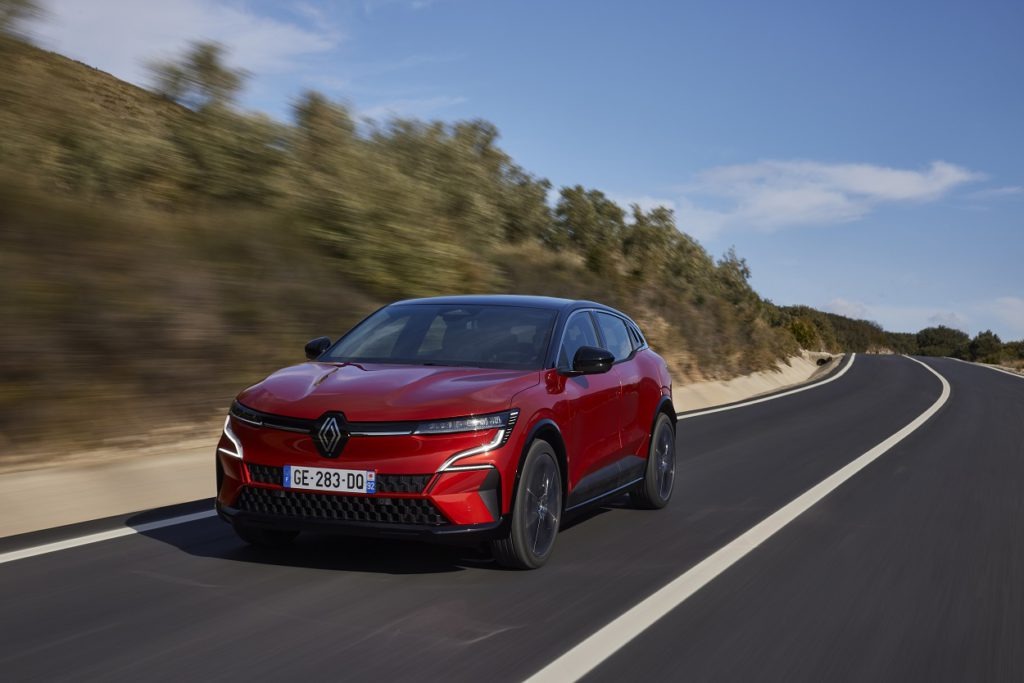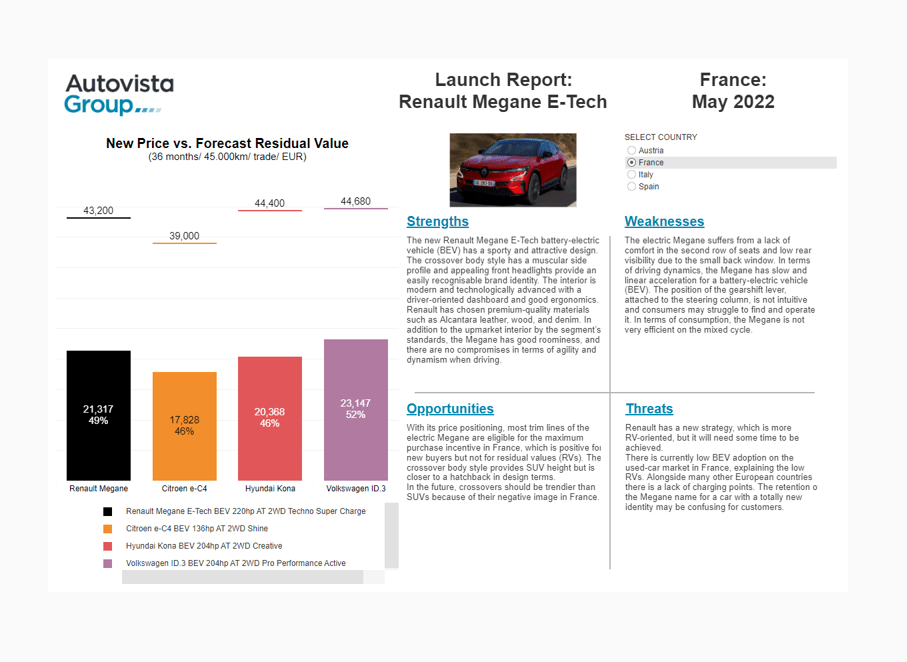Launch Report: Renault Megane E-Tech Electric brings class-leading range to the C-segment
06 May 2022

Renault has extended its Megane line-up with the launch of a battery-electric vehicle (BEV) version. The Renault Megane E-Tech Electric is significantly differentiated from the existing internal-combustion engine (ICE) and plug-in hybrid (PHEV) versions in several ways. The BEV’s exterior is 14cm shorter but 6cm taller, with a crossover-like design and a new logo that is a clear sign of the French carmaker’s new design direction. Everything about the electric Megane is new: the platform, the design, and the interior, as well as the all-electric drive.
The car’s coupé-like side profile, with narrow windows and strikingly large wheel arches, as well as detailed front and rear light signatures, gives the Megane a purposeful and strong look. Despite being slightly smaller than its main rival, the Volkswagen ID.3, the Megane offers competitive interior space in the front, while the boot holds a generous 440 litres. However, the high, upward-sloping waistline and the slightly dropping roofline combine to reduce headroom in the rear and the small back window limits visibility.
The Renault Megane E-Tech Electric is comfortable and stable to drive, with low cabin noise, but has comparatively slow and linear acceleration for a BEV. The position of the gearshift lever, attached to the steering column, is not intuitive and consumers may struggle to find and operate it.
Increased range
The modern interior offers high-tech features, dominated by the eye-catching 12.3-inch digital instrument cluster and a nine-inch or 12-inch central touchscreen. The displays use the premium OpenR Link system based on Google’s Android Automotive and are superior to many other systems, especially in terms of voice control. Renault has also chosen premium-quality materials such as Alcantara leather, wood, and denim.
The all-electric Megane is available with either a 40kWh or 60kWh battery, with 130hp or 220hp driving the front wheels. A larger battery is not available for the time being, but AC charging at 22kW is possible. Moreover, versions with the 60kWh battery have a higher range than C-segment rivals, up to 470km. Consumption is comparatively low too, thanks to a sophisticated energy-management system, including oil-cooled and heated batteries and optimised interior climate control.
The Megane E-Tech is not the cheapest BEV, especially if consumers add optional equipment and assistance systems. However, standard equipment is fairly comprehensive, even at the entry trim level, and the price is justified by the vehicle’s range and efficiency.
Dropping back
Renault was one of the first established manufacturers to enter the world of electromobility and was particularly successful with the Zoe model. Surprisingly, Renault was then hesitant to introduce additional BEVs and is no longer renowned as being a pioneer of the technology.
The retention of the Megane name for a car with a totally new identity may be confusing for customers. Both the Megane E-Tech Electric and the Megane E-Tech PHEV are on sale but despite bearing the same name, the two cars have almost nothing in common. This could lead to confusion about the features and the considerable progress that has been made with Renault’s latest BEV.
Nevertheless, the brand’s consolidated background in electromobility, with more than 10 years of experience in the field, supports the credibility of the Megane E-Tech. The model is also a much newer choice than some of its rivals, such as the Volkswagen ID.3, which was launched in 2020, and the Nissan Leaf, introduced in 2017.
The range of BEV models on the market is growing, meaning greater competition. In addition to hatchbacks, SUVs are strong rivals to the Megane E-Tech. As well as popular models such as the Peugeot e-2008 or Hyundai e-Kona, others have been recently renewed, such as the Kia e-Niro. Other new models are coming soon too, including the Nissan Ariya.
Since mid-2020, new CEO Luca de Meo has brought a breath of fresh air to Renault. One important goal of his Renaulution strategic plan is to make the brand a pioneer for new mobility again and to strengthen the energy transition through electric and hydrogen solutions. By 2025, 14 new models, seven of them fully electric, are to offer the most environmentally-friendly powertrain mix of all European manufacturers.
View the Autovista Group dashboard, which benchmarks the Renault Megane E-Tech Electric in Austria, France, Italy, and Spain for more details. The interactive launch report presents new prices, forecast residual values, and SWOT (strengths, weaknesses, opportunities, and threats) analysis.




